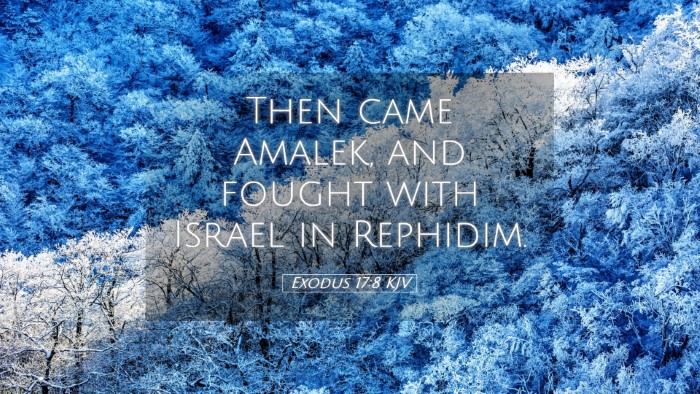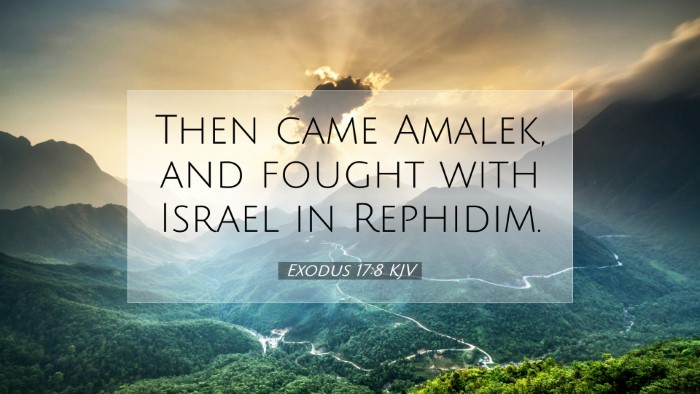Commentary on Exodus 17:8
Exodus 17:8 states: “Then came Amalek, and fought with Israel in Rephidim.” This verse marks a significant point in the journey of the Israelites, introducing the conflict with Amalek, a descendant of Esau, and a symbol of opposition to God's people.
Overview of the Conflict
This conflict represents more than just a physical battle; it illustrates the ongoing spiritual warfare faced by believers. Amalek is often perceived as a type of the flesh, the world, and the devil—all forces opposing God's purposes.
Insights from Matthew Henry
Matthew Henry suggests that the attack by Amalek signifies how the enemies of God often strike when the people of God are most vulnerable. He emphasizes that the Israelites were weary and in need of God's strength, indicating that adversity often comes at the most inconvenient times, when believers feel least equipped to respond. This highlights the necessity of spiritual readiness and reliance on divine support.
He further notes that God allows such trials to perfect His people, teaching them dependence on Him. Henry argues that the battle signifies the continuous struggle between good and evil—the same struggle that Christians face every day.
Insights from Albert Barnes
Albert Barnes focuses on the historical context of Amalek as a nation that harbored a deep-rooted hostility against Israel. He points out that this animosity is indicative of the long-standing enmity between the descendants of Jacob and Esau, and how this strife transcends mere genealogy, impacting the spiritual heritage of Israel.
Barnes also reflects on the implications of Israel’s reliance on Moses and the leadership dynamics exhibited during the confrontation. He views Moses as a type of Christ, interceding for the people while Joshua leads the military effort, symbolizing how spiritual battles require both intercession and action.
Adam Clarke’s Perspective
Adam Clarke provides a philological approach, investigating the significance of the name “Amalek.” He suggests that it derives from the Hebrew for “people who dwell in the valley,” indicating a foe that seeks to ambush God’s people when they are most susceptible. He interprets Amalek’s actions as representing the trials and temptations faced by believers, which can assail them at their weakest moments.
Clarke also emphasizes the importance of unity in the face of opposition, as seen in Israel’s response to the threat. By standing together under Moses’ command, they exemplify the communal strength and mutual support essential among believers when confronting challenges.
Theological Implications
The struggle against Amalek teaches vital lessons about reliance on God in spiritual warfare. In examining the broader theological implications of this verse, it becomes clear that believers today still encounter their ‘Amalek’—the persistent adversaries of faith, doubt, and temptation that threaten to overwhelm.
- Spiritual Vigilance: Exodus 17:8 encourages believers to remain vigilant, aware that adversity can arise unexpectedly.
- Divine Assistance: The intervention of God represents the assurance that He is a refuge to those who call upon Him in times of need.
- Intercessory Prayer: The role of Moses demonstrates the power of prayer and intercession, reinforcing that believers should lift each other up in the face of trials.
Practical Applications
For pastors, students, theologians, and Bible scholars, the insights from Exodus 17:8 can be translated into various practical applications:
- Encouragement in Trials: Like the Israelites, congregants may feel overwhelmed in their struggles; encouragement through Biblical examples can provide hope.
- Teaching on Spiritual Warfare: Use this narrative to inform teaching about the nature of spiritual conflict and the importance of preparation and unity.
- Promoting Intercession: Foster a culture of prayer within the community, highlighting its power and necessity as demonstrated in Moses’ actions.
Conclusion
Exodus 17:8 serves as a stark reminder of the battles that believers face, portraying the necessity of divine support, communal strength, and the importance of intercessory prayer. The reflections from Matthew Henry, Albert Barnes, and Adam Clarke converge to provide a holistic understanding of this pivotal verse, encouraging ongoing engagement in spiritual battles through faith, prayer, and communal support.


